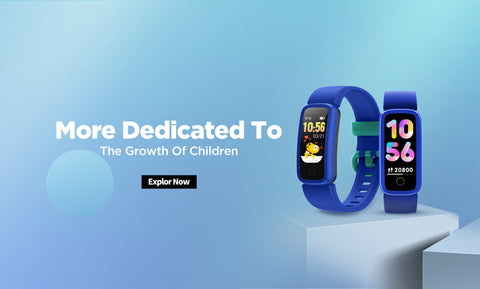The fitness tracker trend is in full swing. But are they right for kids? Learn why you might want to measure kids’ activity levels–and when you shouldn’t.

Seeing fitness trackers everywhere? That’s no surprise. Between 20-40% of American adults use “wearable fitness devices” or fitness trackers, and the trend is expanding to include kids, too.
Fitness trackers promise a world of ease and progress in physical fitness. They help us make incremental improvements, nudge ourselves to be active, and celebrate personal bests.
But when you watch your eight-your-old bounding across the back yard with his friends, you might struggle to see how the fitness tracker mentality applies to kids. Do you want your kids to enter into the tech-heavy world of fitness tracking? Or is it better for them to play and move free of devices?
Read on to learn why and when you might choose to let your kids use fitness trackers… and the specific circumstances your kids might be better off without them.
When to Say “Yes” to Fitness Trackers for Kids

If you’re on the fence about buying your kids a fitness tracker, take a close look at your individual child and your shared motivations for wanting a fitness tracker. Consider a tracker if one or more of these circumstances rings true:
- When it’s just for fun. Healthy, active kids might like to turn fitness trackers into game time. Let them run, jump, tumble, and play, and rack up “points” on their trackers.
- When you need track your kids’ activity levels for medical reasons. Kids with medical conditions as diverse as diabetes to ADHD might benefit from using fitness trackers. Think of trackers as a tool to help you better understand symptoms and promote wellness.
- When your teen athlete is working toward specific fitness goals. Fitness trackers can help teen athletes improve their performance at a healthy pace.

-
When to Say “No” to Fitness Trackers for Kids
Wearable devices don’t automatically help your kids, and they might even carry the potential for harm. Here are four times a fitness tracker probably isn’t right for your kids.
- Your kid doesn’t want to wear one. If a fitness tracker feels like an obligation, your child might come to feel negatively toward physical activity–the opposite of what you’re aiming for!
- You’re concerned that your child is focusing too strictly on health. If you start to notice what appears to be an excessive focus on exercise and/or regimented eating habits, a fitness tracker probably isn’t appropriate. In this case, please reach out to your family doctor or pediatrician with your concerns.
- You’re having a low-tech moment. Technology abounds in our environment, and going without it can feel like a breath of fresh air for you and your kids. If you want your kids to tune in to their surroundings on the trail, for example, leave the fitness trackers at home.
- You want to foster a love of physical activity for its own sake. One of the biggest benefits of physical activity and exercise is that it makes us feel good. Period. If you want to foster a love of movement and play, you might choose to forgo the system of competition and reward that’s inherent in kids’ fitness trackers.


